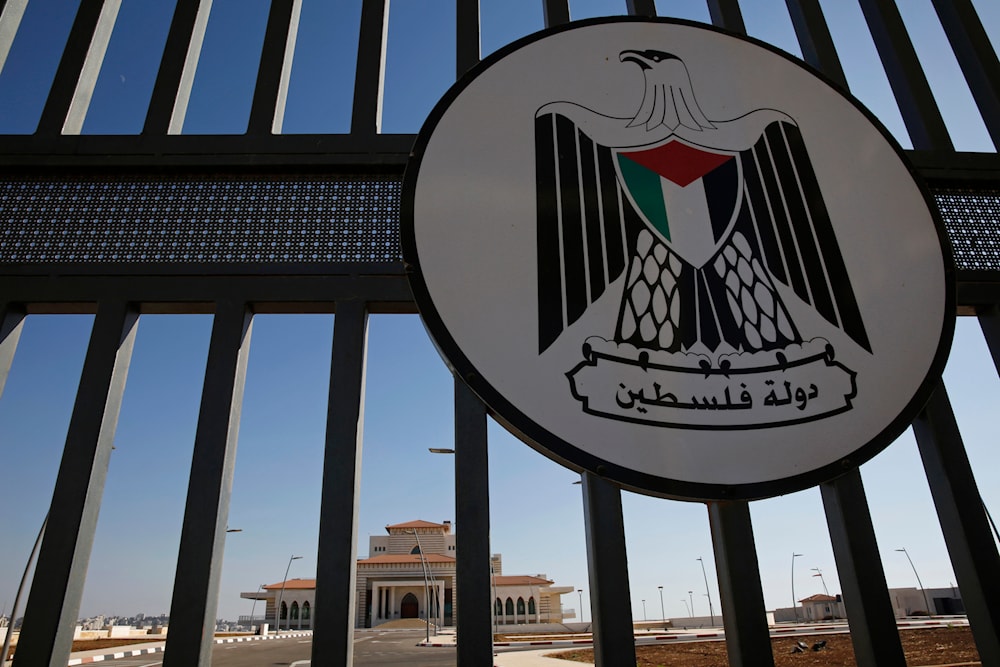Palestinian presidency, MoFA condemn Netanyahu's 'post-war' Gaza plan
Netanyahu's post-war Gaza re-occupation plan has prompted Palestinian officials to condemn it and further call for the end of Israeli occupation.
-

This photo taken Monday, Aug. 28, 2017, shows a mansion for the Palestinian Authority, on the outskirts of the West Bank city of Ramallah. (AP)
The Palestinian Foreign Ministry strongly condemned Israeli Prime Minister Benjamin Netanyahu’s plans for "post-war" Gaza, emphasizing that they constitute “an official reoccupation of the Gaza Strip and the imposition of Israeli control over it.”
In a statement, the Ministry bashed the document of principles submitted to the war cabinet by Netanyahu last night regarding Gaza's re-occupation.
The Palestinian Foreign Ministry described the document as “a plan to prolong the genocide against our people and an attempt to gain more time to implement the displacement plans.”
It further added that it is “a blatant maneuver to intercept and thwart American and international efforts made to link stopping the war and releasing prisoners and hostages to resolving the conflict and embodying the Palestinian state on the ground.”
In this context, the Palestinian Foreign Ministry urged the US and other Western countries to acknowledge the Palestinian sovereignty and allow it to become a UN member state and hold an international peace conference to “end the occupation and enable our people to exercise their right to self-determination freely and with dignity.”
Ministry of Foreign Affairs and Expatriates//Netanyahu's principles mean reoccupying the Gaza strip and obstructing American and international efforts to establish the Palestinian State.
— State of Palestine - MFA 🇵🇸🇵🇸 (@pmofa) February 23, 2024
Netanyahu's plan serves his interest in prolonging the war to stay in power.… pic.twitter.com/v9DwtXFr6a
Spokesman of the Palestinian President opposes Netanyahu's re-occupation
In response to Netanyahu's "day-after" plan for Gaza, Nabil Abu Rudeineh, the spokesperson for Palestinian President Mahmoud Abbas, stated today that "Gaza will only be part of the independent Palestinian state with Jerusalem as its capital."
He added, "Any plans to the contrary are destined to fail. Israel will not succeed in attempts to alter the geographic and demographic reality in the Gaza Strip."
"If the world wants security and stability in the region, it must end the Israeli occupation of Palestinian territories and recognize the independent Palestinian state with Jerusalem as its capital," Abu Rudeineh emphasized.
The Presidential spokesperson stressed that "Netanyahu's proposed plans aim to perpetuate Israel's occupation of Palestinian territories and prevent the establishment of a Palestinian state."
Netanyahu's re-occupation of Gaza
Israeli Prime Minister Benjamin Netanyahu presented the Israeli war cabinet yesterday with a document of principles regarding the occupation's plots for the future of the Gaza Strip.
Although discussions regarding these plans have been framed under plans for the "day after" the war on the Gaza Strip comes to an end, the glaring proposition from the document is the continued direct occupation of several sectors in the Gaza Strip. Netanyahu said that the Israeli occupation forces will do so until the full "de-militarization" of the Strip is achieved, adding that their presence in the Gaza Strip will be indefinite.
So what are the main takeaways from the document?
- Israeli occupation forces will continue their war on the Gaza Strip until they achieve their preset goals for the Gaza Strip. - This includes the "destruction of the military capabilities and governmental infrastructure of" the Palestinian Resistance;
- Returning all Israeli captives held in the Gaza Strip via military means;
- Removing "any security threat from the Gaza Strip" in the long run;
- Doing so via the indefinite presence of occupation forces in the Gaza Strip. - The complete de-militarization of the Gaza Strip, excluding a police force that will be collaborating with Israeli authorities.
- An invasion of the southernmost city of Rafah will be launched, which will be paired with the complete occupation of the Palestinian side of the Palestinian-Egyptian border — known as the Philadelphi Axis.
- Excavation work for "buffer zones" that section the Gaza Strip will proceed.
- Plans for the "de-radicalization" of the Gaza Strip by directly altering its educational system and controlling its mosques will be implemented.
- The United Nations Relief and Works Agency for Palestine Refugees in the Near East (UNRWA) will be dissolved and replaced with other international organizations.
- A local government that will only run civilian affairs will be established, which will be run by local collaborators who have no ties to the Palestinian Resistance.
- The reconstruction of the Gaza Strip with only commence after the "de-militarization" of the Gaza Strip is achieved and the implementation of the "de-radicalization" process begins.
Many of the aforementioned policies have either been explicitly articulated by Netanyahu in press conferences or interviews or have circulated as rumors within media circles. However, the Israeli Prime Minister has yet to garner the support of members of the war cabinet and the members of the coalition government.

 4 Min Read
4 Min Read










